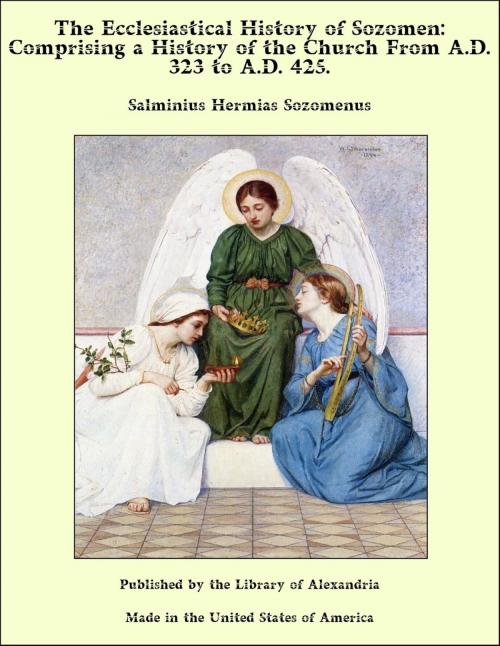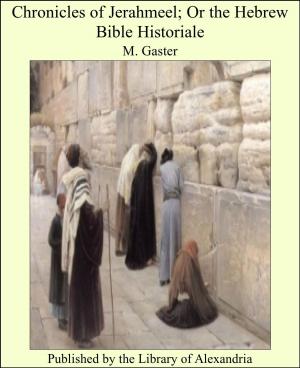The Ecclesiastical History of Sozomen: Comprising a History of the Church From A.D. 323 to A.D. 425.
Nonfiction, Religion & Spirituality, New Age, History, Fiction & Literature| Author: | Salminius Hermias Sozomenus | ISBN: | 9781465607867 |
| Publisher: | Library of Alexandria | Publication: | March 8, 2015 |
| Imprint: | Language: | English |
| Author: | Salminius Hermias Sozomenus |
| ISBN: | 9781465607867 |
| Publisher: | Library of Alexandria |
| Publication: | March 8, 2015 |
| Imprint: | |
| Language: | English |
My mind has been often exercised in inquiring how it is that other men are very ready to believe in God the Word, while the Jews are so incredulous, although it was to them that instruction concerning the things of God was, from the beginning, imparted by the prophets, who likewise made them acquainted with the events attendant upon the coming of Christ, before they came to pass. Besides, Abraham, the founder of their nation and of the circumcision, was accounted worthy to be an eye-witness, and the host of the Son of God. And Isaac, his son, was honored as the type of the sacrifice on the cross, for he was led bound to the altar by his father and, as accurate students of the sacred Scriptures affirm, the sufferings of Christ came to pass in like manner. Jacob predicted that the expectation of the nations would be for Christ, as it now is; and he likewise foretold the time in which he came, when he said “the rulers of the Hebrews of the tribe of Judah, the tribal leader, shah fail.” This dearly referred to the reign of Herod, who was an Idumean, on his father’s side, and on his mother’s, an Arabian, and the Jewish nation was delivered to him by the Roman senate and Augustus Caesar. And of the rest of the prophets some declared beforehand the birth of Christ, His ineffable conception, the mother remaining a virgin after His birth, His people, and country. Some predicted His divine arid marvelous deeds, while others foretold His sufferings, His resurrection from the dead, His ascension into the heavens, and the event accompanying each. But if any be ignorant of these facts it is not difficult to know them by reading the sacred books. Josephus, the son of Matthias, also who was a priest, and was most distinguished among Jews and Romans, may be regarded as a noteworthy witness to the truth concerning Christ ; for he hesitates to call Him a man since He wrought marvelous works, and was a teacher of truthful doctrines, but openly calls him Christ; that He was condemned to the death of the cross, and appeared alive again the third day. Nor was Josephus ignorant of numberless other wonderful predictions uttered beforehand by the holy prophets concerning Christ. He further testifies that Christ brought over many to Himself both Greeks and Jews, who continued to love Him, and that the people named after Him had not become extinct. It appears to me that in narrating these things, he all but proclaims that Christ, by comparison of works, is God. As if struck by the miracle, he ran, somehow, a middle course, assailing in no way those who believed in Jesus, but rather agreeing with them.
My mind has been often exercised in inquiring how it is that other men are very ready to believe in God the Word, while the Jews are so incredulous, although it was to them that instruction concerning the things of God was, from the beginning, imparted by the prophets, who likewise made them acquainted with the events attendant upon the coming of Christ, before they came to pass. Besides, Abraham, the founder of their nation and of the circumcision, was accounted worthy to be an eye-witness, and the host of the Son of God. And Isaac, his son, was honored as the type of the sacrifice on the cross, for he was led bound to the altar by his father and, as accurate students of the sacred Scriptures affirm, the sufferings of Christ came to pass in like manner. Jacob predicted that the expectation of the nations would be for Christ, as it now is; and he likewise foretold the time in which he came, when he said “the rulers of the Hebrews of the tribe of Judah, the tribal leader, shah fail.” This dearly referred to the reign of Herod, who was an Idumean, on his father’s side, and on his mother’s, an Arabian, and the Jewish nation was delivered to him by the Roman senate and Augustus Caesar. And of the rest of the prophets some declared beforehand the birth of Christ, His ineffable conception, the mother remaining a virgin after His birth, His people, and country. Some predicted His divine arid marvelous deeds, while others foretold His sufferings, His resurrection from the dead, His ascension into the heavens, and the event accompanying each. But if any be ignorant of these facts it is not difficult to know them by reading the sacred books. Josephus, the son of Matthias, also who was a priest, and was most distinguished among Jews and Romans, may be regarded as a noteworthy witness to the truth concerning Christ ; for he hesitates to call Him a man since He wrought marvelous works, and was a teacher of truthful doctrines, but openly calls him Christ; that He was condemned to the death of the cross, and appeared alive again the third day. Nor was Josephus ignorant of numberless other wonderful predictions uttered beforehand by the holy prophets concerning Christ. He further testifies that Christ brought over many to Himself both Greeks and Jews, who continued to love Him, and that the people named after Him had not become extinct. It appears to me that in narrating these things, he all but proclaims that Christ, by comparison of works, is God. As if struck by the miracle, he ran, somehow, a middle course, assailing in no way those who believed in Jesus, but rather agreeing with them.















